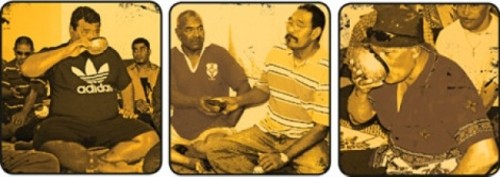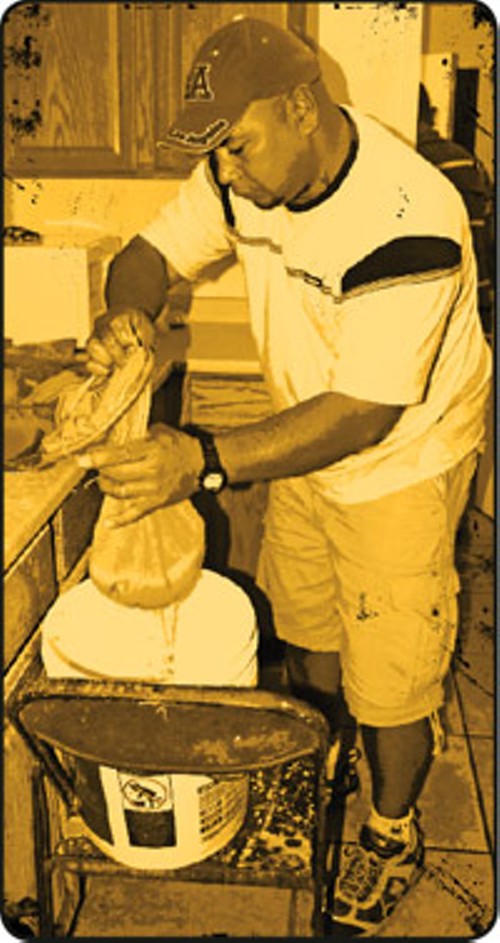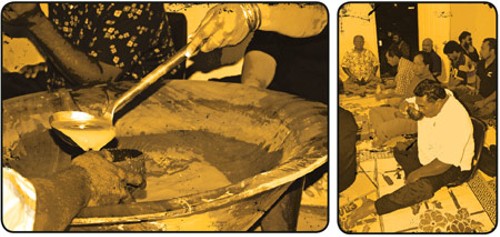From the outside, the house in Salt Lake City’s west-side Glendale neighborhood looks like any other. It is a hot summer evening, and the front door is propped wide open. Inside, some 40 men sit cross-legged on small stools, facing east. The living room is cleared of furniture, and in the adjoining dining room, woven tapestry mats called falas cover the floors.
The white walls are sparsely decorated with a few photos of men in the group wearing matching shirts. The Tongan national crest hangs prominently on the front wall.
A house, yes, but not a home. No one actually lives here, but people can be found here just about any hour of the day or night, just about any day of the week.
This is a place where men of Pacific Islander descent gather to drink kava—an ancient and mildly psychoactive beverage that is central to celebrating social and cultural rituals. Some of the men here this night are in their 20s, but most are middle-age. Still others have full heads of gray hair. Most wear shorts and T-shirts, and their feet are bare after removing their sandals or flip-flops. The room hums softly with the sound of conversation in their native Tongan tongue.
This is a place for laughter and enjoyment, but being out of control is strictly forbidden. There is small talk and joking. The men move freely into more serious topics then back again to the lighter side. Recounting tales of days back on the island is a must.
This is a glimpse of fai’kava, a term which roughly translates as “to do kava.” The friends will sit together in this house, and fai’kava for at least a couple of hours—often all night long.
The drink itself isn’t much to look at. A light-brown liquid, kava is a combination of water and the pulverized root of a plant native to the Polynesian islands. It has the unique ability to create an overall feeling of relaxation in the body without altering clarity of the mind. Men have said that drinking kava soothes the body while keeping the mind sharp.
Every 10 or 15 minutes, two men sitting in a corner begin strumming acoustic guitars and singing in Tongan. Others soon join in. The lyrics are of love, loss, pain, good times, bad times, old memories. A song about a long-past civil war that ended with Tonga being united under one king gets most of the room singing along.
Kava has traditionally been key to Polynesian ceremonies or momentous life events, whether they involve Tongan royalty, Samoan chiefs, weddings or funerals. But views on the drink and its purpose are shifting as more Polynesians absorb American lifestyles and attitudes toward leisure.
Some Salt Lake City Pacific Islanders feel that keeping the kava culture going means keeping an essential part of their homeland alive here in America. Others say kava should only be used on ceremonial occasions. Still others feel that any use of kava violates the rules of their religion. All three views seem to peacefully co-exist within Utah’s Polynesian cultures, where one can always expect support—regardless of how one views or uses kava. Stronger than any feelings about the drink is a bedrock emphasis on extended family relations and helping one another.
Periodically someone tosses a folded bill—$20, $50, even $100—to a man in the middle of the room who keeps the cash laid out in front of him on a small wooden board. He unfolds and holds up the bill, then offers a short speech of gratitude for the donation. Cries of Malo’! ripple through the room. An LDS ward bishop happens to be visiting from Tonga tonight and the donations, which can easily surpass $1,000, will go back with him to the island to help buy a bus for transporting children from a small village to a school.
Recreation and Religion
The focal point of the kava club sits front and center in the room. The kumete is a large, carved wooden bowl about three feet across, filled with a liquid that looks, smells and tastes like little more than muddy water. The only female in attendance, an unmarried woman called a tou’a, sits in front of the kumete and, while stirring, ladles the kava into coconut-shell cups. The men then pass the cups, hand-to-hand, throughout the room.
For these men, this night out is as natural to their island culture as a typical night for American-born men at the American Legion Post or quaffing beers while watching Monday Night Football. The kava club is a social event that, like so many other customs rooted in other cultures, is evolving as Polynesians assimilate into American society.
Factoring into attitudes about kava consumption is the LDS Church. According to church’s statistics, Tonga has the highest percentage of LDS population of any nation on earth. The Mormon Church claims over 53,000 members on an island where the total population is around 116,000. Samoa ranks a close second, with 65,000 LDS members on an island with a population of slightly less than 200,000.
Given the number of immigrants in relation to their country of origin, what happens in Utah is not without effect back in the islands. For example, close to 7,000 Tongans call Utah home—a significant number, given the total population on the island.
Relaxing the Body But Not the Mind
People can do stupid, if not dangerous and illegal, things while under the influence of drugs or alcohol. What if there were a substance that made the body feel good, yet didn’t affect the mind and wasn’t physically addictive?
“‘Drunk’—I don’t even use that term when I talk about kava,” says Jan van der Beek. “I can drink kava for 10 straight hours, but it doesn’t impair my thinking. In 17 years, I have yet to see a guy say a bad word to another guy at a kava party. We’ve never had the cops have to break up a kava party.”
The lead singer for Natural Roots, a reggae band of local Samoan and Tongan musicians, van der Beek even wrote an often-downloaded song that sums up the kava experience with the lyrics, “I’m feelin’ irie from my head to my toes, but my mind is so clear.”
Drinking kava is legal; it has even been used in nutritional supplements available in health food stores promising a variety of benefits such as aiding sleep or reducing anxiety.
“Instead of going to a bar and spending $20, we come here and share [donations] with our cousins,” says Isileni Fiefia, a member of one of the three or four kava clubs that can be found operating almost every night in the Glendale area. “The $20 we spend here is very useful in Tonga.”
Kava use in Tonga has been traditionally associated with royalty, and in Samoa (where it’s known as ’ava), tribal chiefs used it to build their communities and forge alliances.
“It’s like a sacrament. It symbolizes a covenant,” explains Rich Kaufusi, who runs a minority scholarship program at the University of Utah and is an LDS stake president in Salt Lake City. “In any important ceremony, kava is there before anything else takes place.”
While Tongan kava clubs and Samoan kava parties are loosely modeled on traditional ceremonies, for some, recreational kava is a long way—too far away—from the original intent of the beverage.
“It’s been hijacked by the rising generation,” says Kaufusi. “Are they bad people? No. They do some good things,” he says, referring to the fund-raising efforts for the homeland. “But it used to be used as a validation of something taking place. Now, it’s more often used for just getting away from home.”
Kava Me, Please
While traditionalists bemoan cavalier kava use at clubs or parties, those who use it recreationally say they are simply trying to keep traditions alive.
“This is where we remember where we came from,” Fiefia says of the kava club. “People feel at home here. This is more like a family gathering. Wherever you came from on the island, when we come here, we become a family.
“In Tonga, we never did have money, so we shared everything. We still have that sharing in our heart even though we live in a different country.”
“It’s like a community here,” says Lani Mo, president of a Salt Lake City kava club. “We’re around here 24/7 for each other. We come here, and we share about life. We take care of each other. That’s the main point. We share everything we get.”
“I love the camaraderie and the storytelling,” van der Beek says. “Sometimes, we sing. Sometimes, we have fun. Sometimes, we cover real serious topics.”
There is certainly historical justification for Polynesians worrying about the chipping away of their culture while constantly confronted with outside influences. The tattoo culture in Tonga, for instance, was virtually eliminated over time when early Christian missionaries convinced the Tongan king that such practices weren’t “civilized.”
Still, the claim that kava is necessary to preserve the culture makes some within the community bristle, because they feel that men staying out all night, every night, to drink kava can lead to family and economic neglect. Those who criticize recreational use of the beverage link the behavior with general shiftlessness, even the loss of jobs.
Kaufusi says his No. 1 message to young people in the Polynesian community is, “I do not want them to use culture as an excuse for mediocrity. If living my culture means losing my job, then that’s not my culture.”
There is little argument within the kava clubs against that opinion. It would be wrong, they say, for men to skirt their responsibilities because of kava abuse. “You take care of home before you leave,” Mo says.
“We still go to work, and we still raise our families,” Fiefia adds. “Family comes first.”
There is also some distinction in the minds of recreational kava users between fai’kava occasionally, and fai’kava all night, every night. “I think it’s bad when you hear about some kid’s dad doing it every night,” says van der Beek, wistfully.
And some members of another sizeable group within the Polynesian community—women—clearly share that view.
Ladies’ Night?
“It’s upsetting to see married men leaving their families,” says Meme Malungahu who, as a Salt Lake City schoolteacher, believes that extended kava use has adversely affected some of her students’ families. “[Some fathers] are just using kava as a way to get away from home.”
Some women, such as Mele Taukeiaho, an assistant principal in the Salt Lake City School District, register their discomfort with the way some men at kava clubs verbally taunt and make sexual comments to the unmarried women who serve kava at parties. The role was traditionally held by a young woman who was being courted in her family home with the permission of her father. But now, “for some people,” Taukeiaho says, “tou’a is no longer a term associated with tradition, but a degrading term for any female, young or old, desperate enough to make a few hundred dollars a night serving kava.”
While some women criticize kava culture, some younger women take the view that if you can’t beat ’em, make your own bowl of kava.
“I couldn’t believe it when I first heard about it about three years ago,” Malungahu says. Wives were getting the jump on their husbands to go out drinking kava. A rising generation of young women is also growing more vocal about taking a greater role than server at the kava parties. The more traditional men see that as simply “uppity,” and can’t conceive of the practice changing to include equality for women. That would ruin the “boys’ night out” feel, and it would never be allowed at some of the clubs. But others, particularly younger men, seem to have no problem with bringing a date to a kava-laced social event.
Some women in the community don’t see kava use as inherently wrong but feel kava clubs should not involve illicit drugs, gambling or women present other the server.
When Church and Kava Collide
One quiet ripple through Utah’s Polynesian communities concerns the LDS Church’s position on kava use. A spokesman for the church’s public affairs department, which fields all news-media inquiries, says there is no official policy on the drink.
And that unofficial treatment seems to hold up among the kava-drinking culture. Word in the Polynesian community is that ceremonial use is sometimes allowed but that drinking kava merely for recreation probably violates the church’s Word of Wisdom (the official policy, garnered from revelation, that bans alcohol, tobacco and “hot drinks” from the diet).
An attempt to find a middle ground can be seen in the BYU-Hawaii Honor Code, which does not allow “kava clubbing or party drinking,” but goes on to state, “this regulation should not be construed as anticulture, for kava has its vital place in the ceremonies and culture of Polynesia. But there is no doubt in our mind that there is a vast difference between ceremonial drinking of kava … and the party drinking of kava.”
Siaosi Fangalua, who has held many LDS priesthood leadership positions and works at church headquarters translating and editing documents in Tongan, explains: “The Tongan Polynesian LDS Church members are supportive of the ceremonial use of kava. The recreational use of kava, on the other hand, is seen as an unfavorable and unwise use of time and is considered an affront on the integrity of good, wholesome and gospel-oriented family life.”
While some are comfortable with the “ceremonies, yes; parties, no” policy, leaders of the Tongan LDS stakes in Salt Lake City have decided that, rather than determining where to draw the line on kava use, it’s better to ban it altogether. The prohibition is based generally on two talks by LDS general authorities, one in General Conference by Apostle Boyd K. Packer (which did not refer directly to kava but was taken by many Polynesians to implicitly refer to the drink) and another at a meeting of a Utah Tongan stake, in which Apostle M. Russell Ballard is said to have explicitly warned members against the substance.
Supi Ma’ilei, who, as a bishop in a Tongan ward, conducts interviews with members seeking entrance to LDS temples, says he believes kava users are not qualified to receive a temple recommend (the permit required of worthy church members who enter a temple). Ma’ilei does not explicitly ask about kava use when going through the standard temple-recommend interview questions required by the church, but when he asks as to keeping the Word of Wisdom, it is implicitly understood on both sides that the topic includes kava use.
Ma’ilei’s wife, Sini, scoffs at the notion that kava use is required for one to hold on to the Tongan culture, since both she and her husband have worked in jobs providing assistance and reaching out to the Tongan community.
“You speak his name anywhere, and everyone knows he is connected to the culture without participating in kava,” she says of Supi.
“If kava won’t take me to the celestial kingdom, then I need to find other avenues to be connected to the culture,” Supi says.
Kava, American-Style
While the traditional Polynesian cultures are adapting to the American experience, the mainstream culture is also gaining from what Polynesians have to offer. Sometimes, kava shows up in the mix. Every year, Samoan community groups host kava ceremonies and invite Utah politicians to come partake of a cup. Jacob Fitisemanu Jr. attended such a ceremony when doing research for his 50-page senior thesis on Samoan kava use at Westminster College.
“Both cultures value social drinking in one way or another,” he says. “It’s a totally foreign custom, but it’s still a very American custom. I think it provides a link between American and Samoan leadership. Both sides feel a little comfortable and a little uncomfortable. There’s cultural diffusion going both ways.”
And if that’s what’s happening, it’s certainly not a bad thing. We’d probably all be better off by adopting something from a culture where giving of oneself and helping others is expected and the worst of sins is selfishness. Whether the cultural exchange includes kava or not, Polynesians living in Utah are figuring out how to continue their traditions in the midst of larger American and LDS cultures, while still finding a way to unite as a community—differing opinions about kava and all.
cw
More by Geoff Griffin
-
A Family New Year
How to ring in 2020 with revelers of all ages.
- Dec 25, 2019
-
The 12 Arts of Christmas
A delightful dozen options for your holiday entertainment needs.
- Nov 27, 2019
-
Season Kickoff
A look at what's new, or old but great, at Utah's ski and snowboard resorts for the winter season.
- Nov 13, 2019
- More »
Latest in Cover Story
Readers also liked…
-
Forget the family pedigree—Robert F. Kennedy Jr should not be the next president of the United States
Trojan Horse
- Jun 21, 2023
-
Women decry harassment and toxic culture at St. George auto dealership
Men at Work
- Oct 11, 2023






